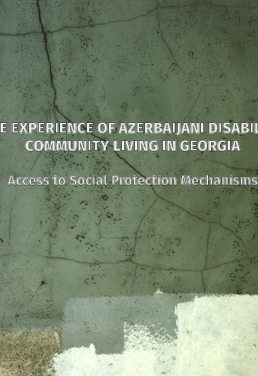საერთო ცხელი ხაზი +995 577 07 05 63


For years, the social protection system of Georgia has been highly flawed and has failed to cover various groups, strengthen them, eradicate poverty and help avoid it. Due to the state inaction, systemic challenges faced by socio-economically vulnerable population persists and require urgent actions.
Failures of the social protection system are felt the hardest by people with one or multiple vulnerabilities. They live in full or partial neglect by the state. They are compelled to face challenges daily related to the geographic, financial and physical accessibility of services, the quality of services, insufficiency of services, as well as neglect of the needs of particular groups in service planning and provision.
Socio-economic vulnerability of people with disabilities and their inaccessibility to respective services is a grave problem in Georgia and globally. [1] Countries around the globe resort to social protection measures to identify the needs of this group and to establish/develop respective support services whose aim is to remove inequalities between people with disabilities and the rest of the population.[2]
Even without additional vulnerabilities, ethnic minorities are outsiders in the social hierarchy that maintains them as society's most socially excluded and neglected group.[3] Discriminatory legislation, policies and practice are often barriers to access to essential services for them; they are also deprived of the opportunities to exercise many rights and freedoms and are particularly susceptible to poverty.[4] Nonetheless, it is substantial that the ethnic minority rights provision discourse goes beyond eliminating discrimination and involves effective political and institutional mechanisms, including those positive measures for protecting people with double or multiple vulnerabilities, as well as consultation and participation mechanisms for ethnic minorities.[5]
Gaps in the social policy hit harder the people with disabilities of dual or multiple vulnerabilities; among them are people with disabilities from ethnic minorities.[6] The problem of service inaccessibility strikes more vividly on the central government level, which, unlike the municipalities, has fewer ties with the population and lower awareness of their needs.
The aim of the proposed research is to expose the main challenges that ethnic minority PwDs face on the central government level regarding their access to social protection and independent living mechanisms and to prepare respective recommendations. To have evaluated state policies in this area and efffectively identified existing gaps, the scope of the research was narrowed down to the Azerbaijani population living in Kvemo Kartli. Nonetheless, existing problems, considering how systemic and complex they are, are relevant for other ethnic minority groups as well.
Social Justice Center wishes that the challenges identified in this research give different stakeholders working on protecting the rights of the PwD community and ethnic minorities one additional advocacy direction. Additionally, considering the scale and the substance of the identified problems, Social Justice Center calls the government institutions to take respective measures to eradicate them in the shortest time.
[1] Report of the independent expert on the question of human rights and extreme poverty, A/63/274, 2008, Para 40.
[2] See the example, Report of the Special Rapporteur on the rights of persons with disabilities, A/70/297, 2015.
[3] Report of the independent expert on the question of human rights and extreme poverty, Arjun Sengupta, E/CN.4/2005/49, 2005, Para. 14; Report of the independent expert on the question of human rights and extreme poverty, Arjun Sengupta, A/HRC/7/15, 2008, Para. 28.
[4] Report of the independent expert on the question of human rights and extreme poverty, A/63/274, 2008, Para. 20, 31; OHCHR, Guiding Principles on Extreme Poverty and Human Rights, 2012, pg. 3.
[5] Report of the Independent Expert on Minority Issues, A/67/293, 2012, Para. 14.
[6] Report of the independent expert on minority issues, Gay McDougall, A/HRC/13/23, 2010, Para. 56.
The website accessibility instruction